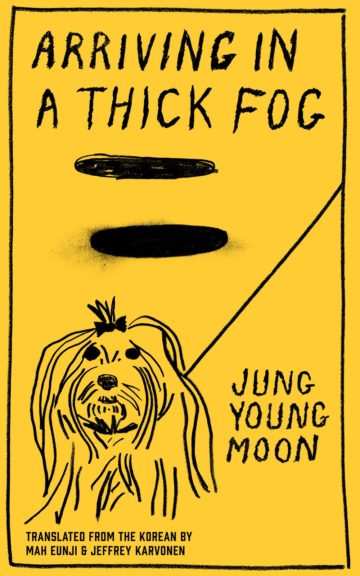
Jung Young Moon’s Strange Novels Cross Continents
Each time Dallas-based publisher Deep Vellum releases a book by Korean novelist Jung Young Moon, a new batch of readers gain exposure to his vivid, bewildering work.
Above: Korean novelist Jung Young Moon.
When Will Evans met the Korean novelist Jung Young Moon in Seoul in 2014 on a trip sponsored by the Literary Translation Institute of Korea, he fell in love with the novelist’s strange and wonderful voice.
Evans, the founder of Deep Vellum, a Dallas-based independent publisher focused on literary translation, read Vaseline Buddha (originally released in Korea in 2010) and “absolutely devoured it.” He published a translation of the book in 2016 and arranged the Texas leg of Jung’s book tour, with events in Dallas, Austin, Houston, and Victoria. When Jung expressed interest in returning to Texas, Evans helped secure him a spot at 100 West, an artist’s and writer’s residency in Corsicana, Texas.
At 100 West, Jung wrote Seven Samurai Swept Away in a River, an incredible little novel about a cult writer from Seoul who’s attending an artist’s residency in a small Texas town and trying to understand what “a true Texan should know.” Using deadpan humor and sprawling meditative sentences, Jung weaves in Texas history with an eye for absurdity. He writes about how when Jack Ruby drove to Dallas to kill Lee Harvey Oswald, he brought his dogs with him and left them in the car while he carried out the murder. He points out that Bonnie and Clyde, both Texas natives, fell in love over cups of hot chocolate.

Jung’s third book to be published by Deep Vellum, Arriving in a Thick Fog, is also about a writer trying to make sense of the world and his place in it. The collection of interlinked novellas takes place in Seoul and at an undisclosed writing residency in France. But as if unable to forget his Texas sojourn, Jung can’t resist including curios of Texas history. His unnamed narrator ambles off on a tangent about a competition between Paris, Texas, and Paris, Tennessee, to build the second-tallest Eiffel Tower in the world. After the Parisians of Tennessee erected an 18-meter-tall model of the Eiffel Tower in 1993, Paris, Texas responded by building an Eiffel Tower 20-meters high. Alas, “[w]hen the people of Paris, Tennessee, built a 21.3 meter Eiffel Tower in 1998, the Parisians of Texas responded by topping their tower with a gigantic red cowboy hat,” he writes. Both cities’ hopes were dashed when Las Vegas built a 165 meter model of its own. (No hat required.)
In all of his novels, which read like voluminous diary entries, Jung doesn’t include much in the way of plot, character, or tension to satiate readers; his books aim to put us in a sort of bewildered trance. In Vaseline Buddha, the narrator states that his goal is to “make all that’s obscure even more obscure.” Indeed, his sentences don’t even follow stream of consciousness but are rather a form of circular consciousness, like a kite, looping in the sky. Sometimes the kite nose-dives into doom—“I was living a strange life devoted to wasting life”—while other times it soars with fanciful ideas, as in the narrator’s desire to fashion a coat for the Paris, Texas, Eiffel Tower to wear along with its red cowboy hat.
The writer-narrator of Arriving in a Thick Fog is afflicted with insomnia and suicidal thoughts, making it more difficult for him to find his way out of an existential crisis. In one scene, he tosses a book by Murakami out the window because it displeases him, watching as it bloats in the rain. He is just as prone to toss his own books out the window, too. While drunk, he calls a friend, demanding she toss one of his novels out her window; she refuses.
Jung Young Moon aims to appeal to readers with eclectic tastes. (Less Murakami, more George Perec.) His books contain seeds of an artistic manifesto. In Arriving in a Thick Fog, his narrator wants to write “an impossible fiction,” an art so out of reach it’s impossible for the writer to execute. He believes a novel should function like a “trap door” ensuring that “the protagonist would never find his way out of the trap he set for himself.”
Jung’s nihilistic narrator also isn’t interested in carrying out his writerly duties. A bit drunk and tired, he hopes that no one will show up to his reading, stating: “I was curious whether people would be furious or pleased if, instead of reading, I stood at the café entrance and handed each one a page ripped out of the novel that I was supposed to read from and sent them away.”
At one point in Arriving in a Thick Fog, the narrator stares down at a potted plant and sees that while the plant is dead, weeds have grown in its place. He begins to water the weeds, seeing no reason why they shouldn’t thrive too. He imagines allowing these weeds to propagate and grow wild throughout his apartment, until he’s enveloped in a lush jungle of stubborn plants.
Readers who appreciate Jung Young Moon’s strange, distinct style will be keen to dive into Deep Vellum’s backlist of his other books, each one like a lucid dream well worth getting lost in.
A few years ago, Evans says Jung told him that in Korea, only five people read his last book—a bit of self-deprecation, Evans suspects. Jung certainly has more than a handful of readers in Texas and will likely gain more. Deep Vellum recently acquired Dalkey Archive, another publisher with an extensive catalog of translated books. Two of those books, A Most Ambiguous Sunday, and Other Stories and A Contrived World, happen to be by Jung Young Moon.


